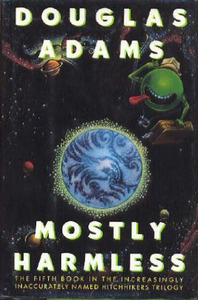Take a photo of a barcode or cover
It’s easy to get disheartened when your planet has been blown up, the woman you love has vanished due to a misunderstanding about space/time, the spaceship you are on crashes on a remote and Bob-fearing planet, and all you have to fall back on are a few simple sandwich-making skills. However, ins...
It may have taken a while to get there, but I think this was my favourite of the whole series.
The fifth book neatly wraps up the Hitchhiker's "trilogy." The writing is classic Douglas Adams, and it was entertaining. I listened to the audio read by the author, which was very well done.
funny
I definitely enjoyed Mostly Harmless--Douglas Adams is a hilarious and well written author--but it was my least favorite book in the series.
I have no idea why I'd never read this book before.
It made me sad at the end.
It made me sad at the end.
(mild spoilers ahead)
It's terribly amusing that the majority of reviewers have tossed this fifth part to the trilogy aside, banished it from their mental schemata of the series so as to acknowledge only that which ends well. I think it says a lot about the readership that they took in the entirety of the first four books without picking up on the melancholy and nihilistic subtext to Adams' writing. I mean, the first book ends with the discovery that the meaning of life is 42.... how much clearer does it need to be in order convey the ultimately meaningless adventure that Adams saw life in this universe to be? More importantly, at what point did that fact ever stop him from telling a spectacular story?
It is the journey, more than the end, that defines us and the worlds we live in. I think Arthur's encounter with the man on the pole in Hawalius can be taken as a pre-emptive response to those who would invariably decry the novel to be "too bleak": humans seek to be protected from knowing the things we don't want to know about, and it leads us to miss a great deal of understanding, experience, and acceptance, sometimes with dire psychological consequences. A reader may not want to know how the story of Arthur and his companions ultimately ends, or how any story that goes on long enough must end, but it's a blind and willful ignorance that serves no purpose but to save us seeing reality, in all its complicated and multidimensional depth of cause and effect and pure probability.
Personally, I found this book to be a brilliant and thought-provoking conclusion to a sharp, touching, and gloriously honest series. The ending of the novel, with Arthur at peace and Ford laughing wildly, is the most honest part yet. I pity any reader who doesn't get that.
It's terribly amusing that the majority of reviewers have tossed this fifth part to the trilogy aside, banished it from their mental schemata of the series so as to acknowledge only that which ends well. I think it says a lot about the readership that they took in the entirety of the first four books without picking up on the melancholy and nihilistic subtext to Adams' writing. I mean, the first book ends with the discovery that the meaning of life is 42.... how much clearer does it need to be in order convey the ultimately meaningless adventure that Adams saw life in this universe to be? More importantly, at what point did that fact ever stop him from telling a spectacular story?
It is the journey, more than the end, that defines us and the worlds we live in. I think Arthur's encounter with the man on the pole in Hawalius can be taken as a pre-emptive response to those who would invariably decry the novel to be "too bleak": humans seek to be protected from knowing the things we don't want to know about, and it leads us to miss a great deal of understanding, experience, and acceptance, sometimes with dire psychological consequences. A reader may not want to know how the story of Arthur and his companions ultimately ends, or how any story that goes on long enough must end, but it's a blind and willful ignorance that serves no purpose but to save us seeing reality, in all its complicated and multidimensional depth of cause and effect and pure probability.
Personally, I found this book to be a brilliant and thought-provoking conclusion to a sharp, touching, and gloriously honest series. The ending of the novel, with Arthur at peace and Ford laughing wildly, is the most honest part yet. I pity any reader who doesn't get that.
Probably the worst of the Douglas Adams Hitchhiker's Guide series, but also my absolute favorite.
I finally got to finish this one. I'd lost some steam with this series after the previous and a bit of the way in this one. (I'd read up to chapter 5, was like meh, and sat it down for a long time). This one seemed to lack a lot of the charm that the first couple had. It really seems like they were really trying to figure out what else to do with the crew. The previous one I was suggested to read in this series, Zaphod Plays It Safe, didn't seem to have anything to do with this one. There was no Zaphod either which I'm kind of meh about. They seemed to really try to make him more important in the other books and then just dropped him like a good habit. The ending of the series really went out on a whimper. The book, at this point, became more of a Vogon check list to mark off. Well...I guess onto other funny sci-fi books and see how the TV series is.




